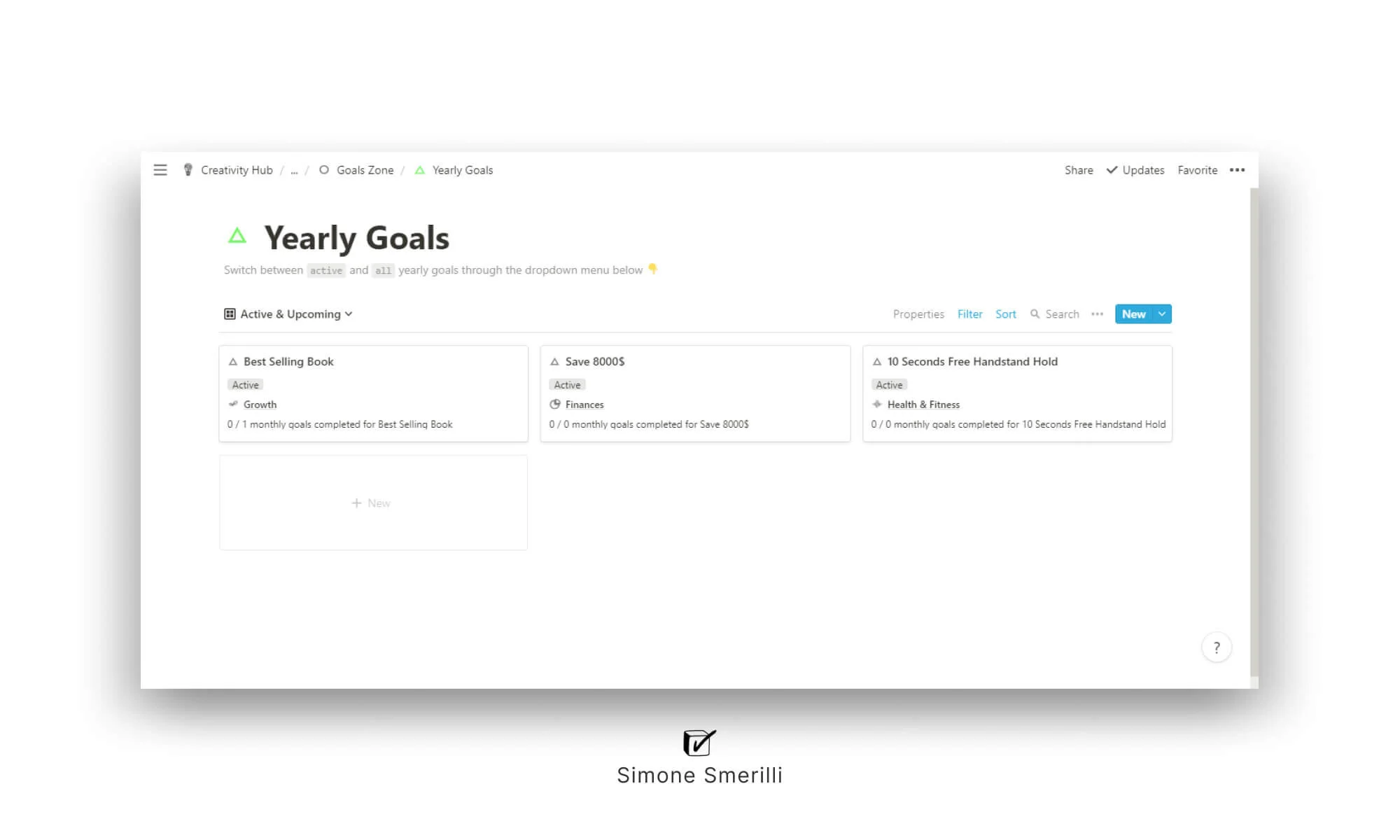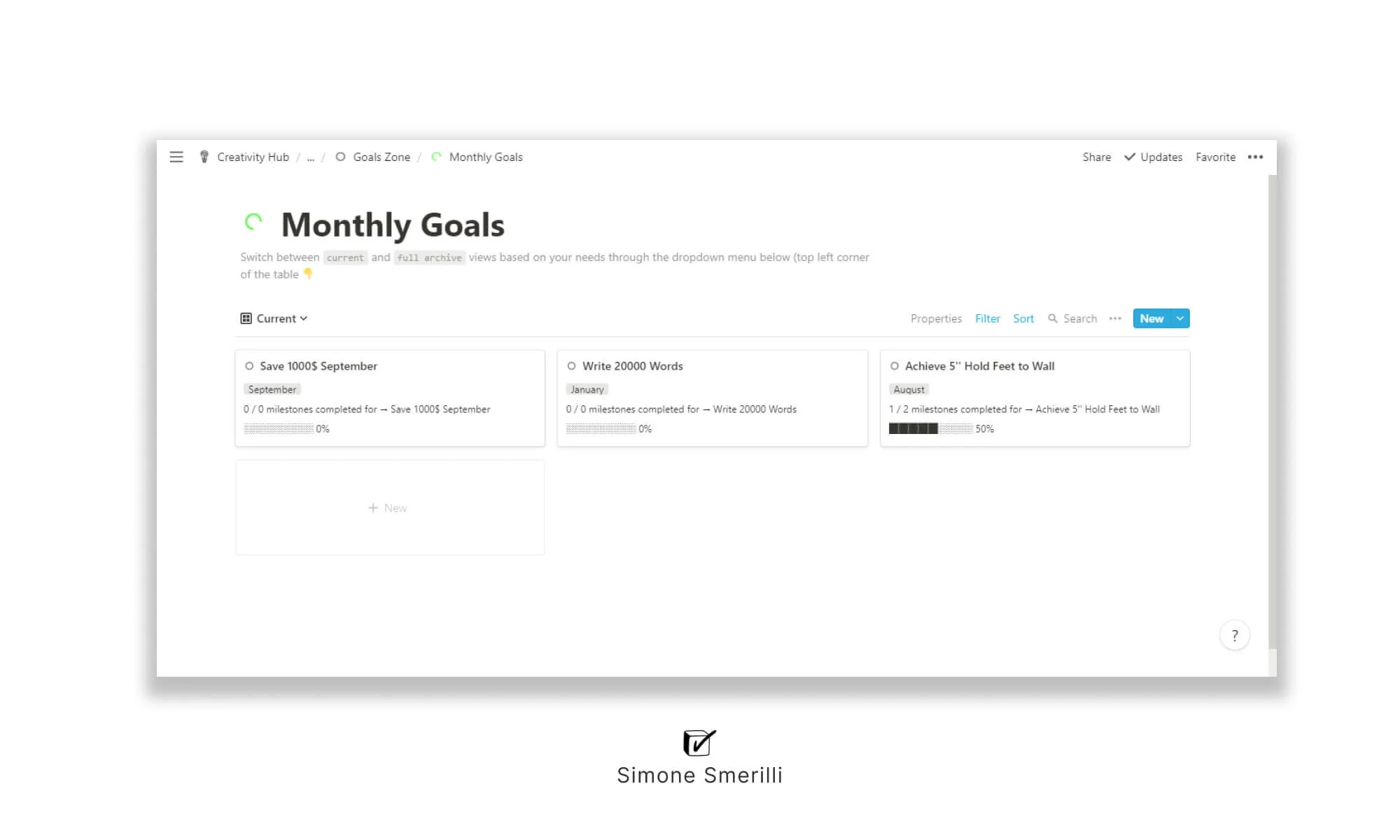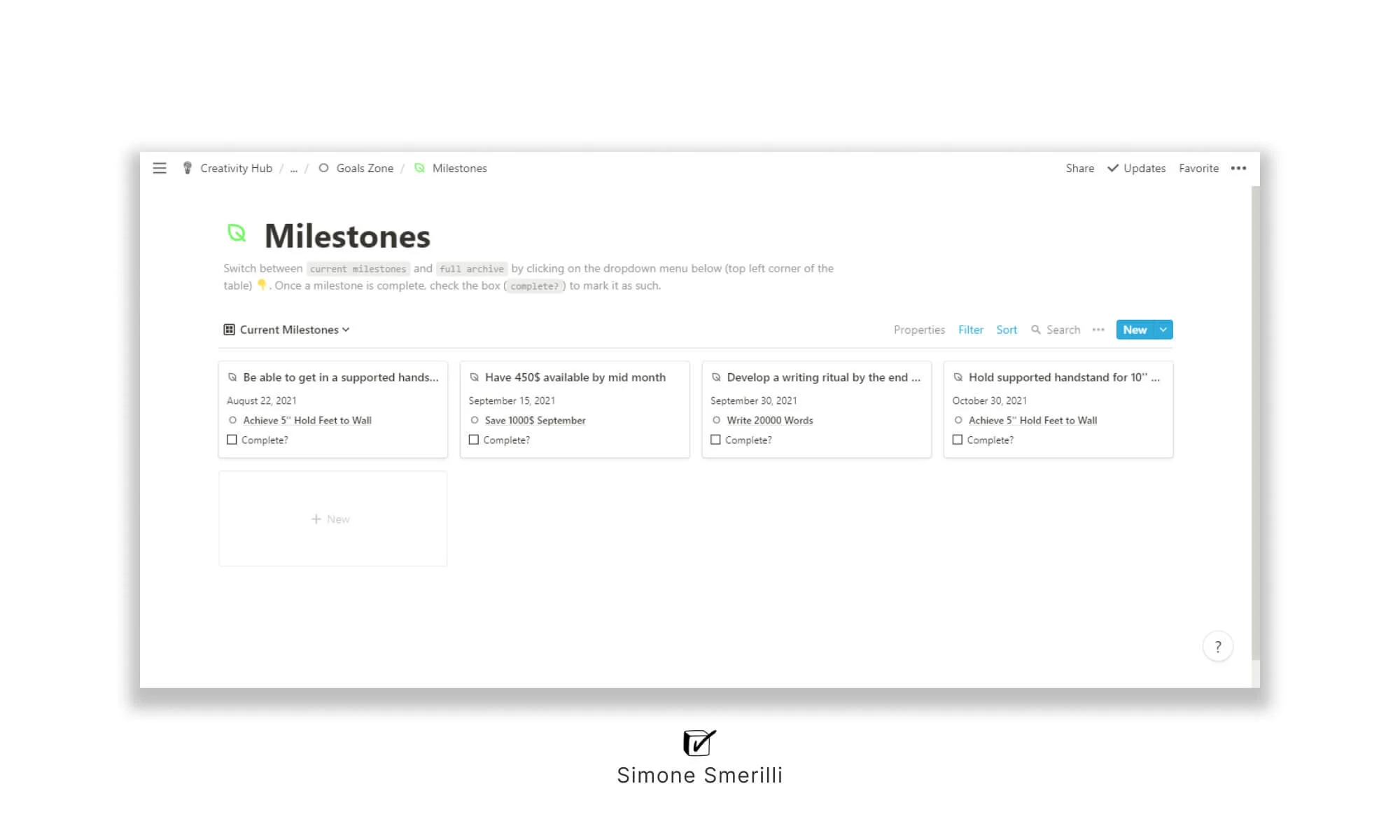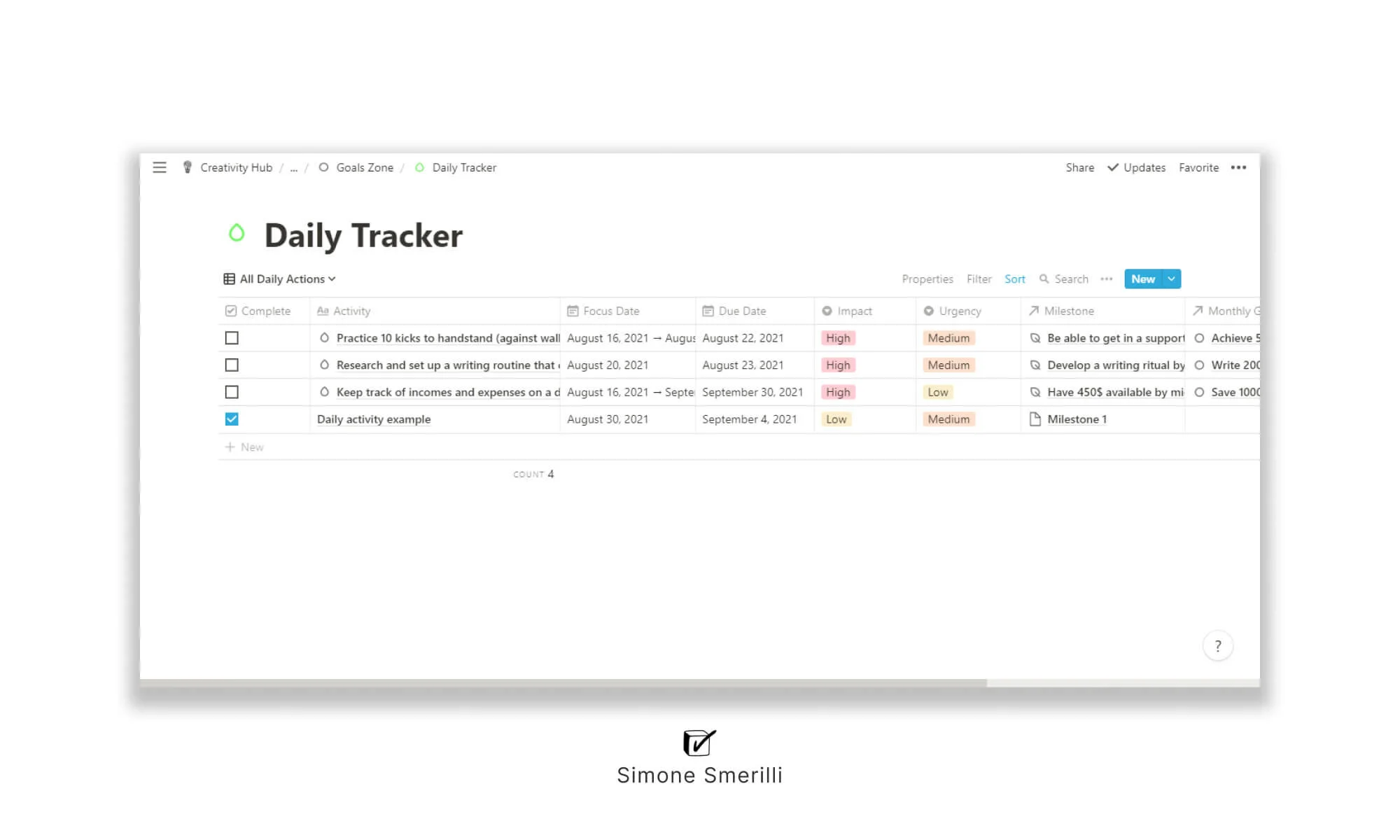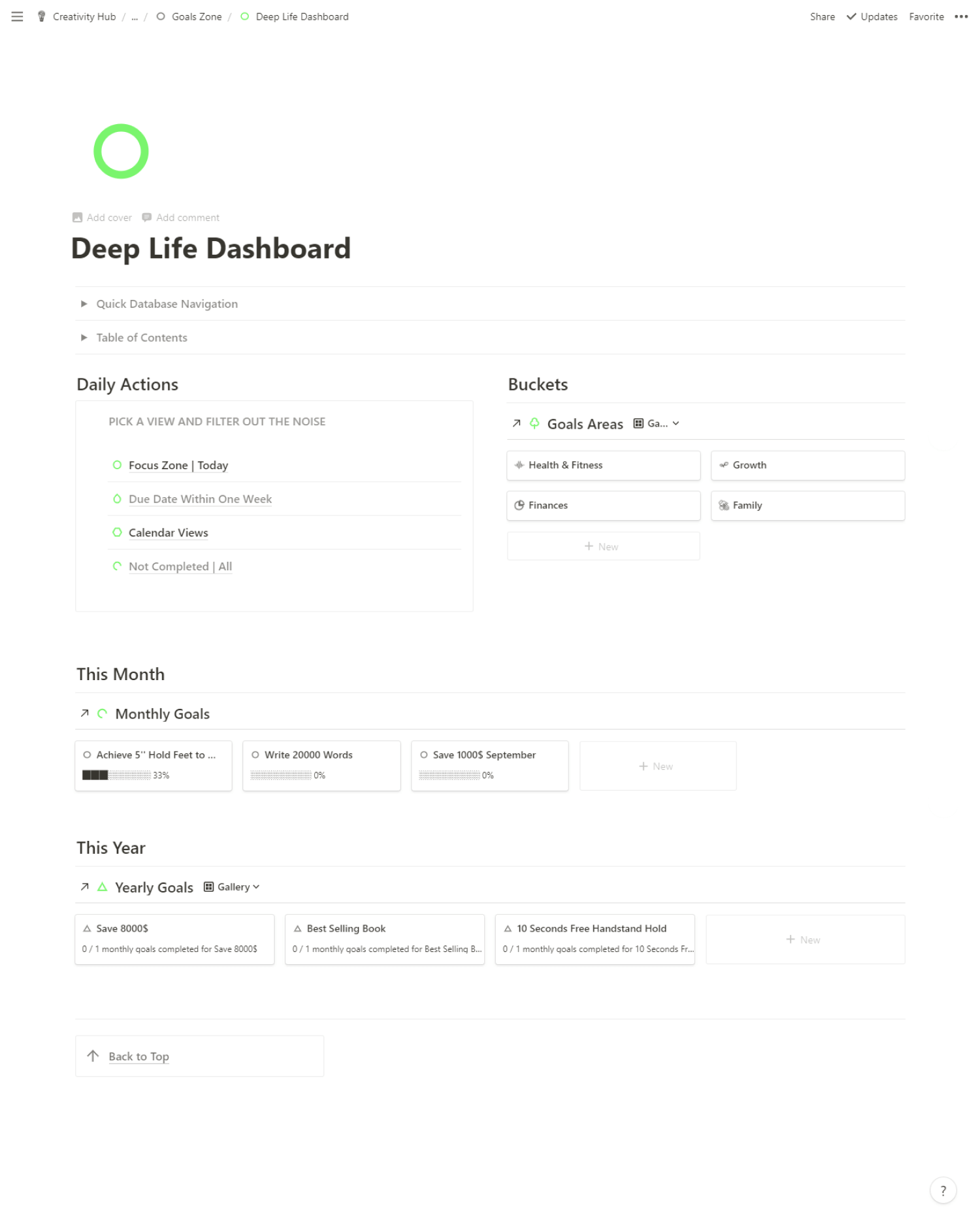The Ultimate Notion Goals Setting System | The “Goals Zone”
The Goals Zone Notion template is a multi-layered goals-setting system. It is aimed at setting and keeping track of goals in your professional and personal life. You will first break down your goals-setting process into Areas, which will then determine the objectives you set for yourself. Each area will have one or more targets associated with it. Setting goals is a "controversial" topic. There is a faction arguing that goal-setting is a future-oriented, rather useless activity to partake in because rooted in the future as opposed to the present moment—the here and now. According to this stream of thought, the process matters much more than the result. Borrowing some concepts from the Buddhist tradition, some proponents of the "no-goal-setting" practice posit that if you channel all your attention on the process, the result will take care of itself. This view emphasizes the relevance of complete presence in the moment and avoidance of mind-wandering in the future. Focusing on the process, some point out, makes the result more enjoyable, fulfilling, worthy. This mental model may be—and this is my consideration—a valuable approach to life due to the immersion in the present moment it fosters, which can function as an ideal for the average modern-day individual. Idealistic views can provide value in and of themselves. Their mere existence produces a North Star to strive for. A North star of similar value and nature of religious worship. There is something to be said in favor of that. Endeavoring for some unreachable ideal can be itself a source of meaning. In addition, placing heavy attention on "the process" has a Stoic component: focus on what you can control (how you behave daily, weekly, monthly, yearly, multi-yearly) instead of attaching your identity to some future, abstract, anxiety-provoking goal. The latter mindset may consume you. And it is striking how the mental models we decide to adopt in our existence can genuinely make a difference. "How you do anything is how you do everything," as Simon Sinek once pointed out.
But is it possible to not set goals at all in life, even at a subconscious level? Are such outcome-driven primates as humans capable of not striving for something concrete? I would postulate that most individuals may need goals to live an energized and meaningful life. They need some sort of concrete outcome to strive for. And if such outcome (or outcomes) is not well-articulated, it is likely subconscious, hidden but present. The person who can articulate his/her goals upon being questioned about them is, generally speaking, considered worthy and "inspirational" by the Western society at large—particularly so if the goals are concrete, idealistic, "noble". We tend to reward people who know where they are aimed. Balance appears to be necessary here too (I say too because balance seems to be almost always the morally correct answer). We need goals as a source of meaning in life, and also as ideals guiding our existence. We need to laser focus on the mundanity of the process to not fall prey to arrogance, cynicism, deceitfulness. Articulating future goals can be eye-opening to many of us. Writing our future intentions down can add a lot of clarity, which can be frightening. Knowing what we want can be frightening because we would be very aware of our deficiencies if we fell short of the goals we lay out in front of us. Articulating a vision can make us aware of failure. That is scary. That is perceived by our social brain as humiliating. Memento mori, the Stoics would say. Remember that you are going to die.
Especially if you score high in conscientiousness, the activity of goal-setting can be life-enhancing, especially when there is chaos in your life and you are wandering around aimlessly. Ideals to strive for can provide a purpose. They can be the petrol station you stumble upon at the hundredth mile of a road trip in rural Africa when your vehicle is about to betray you and your travel companions. If you do not have a direction, how do you know what the process looks and feels like? How do you know if you are doing things most effectively? How do you keep yourself from giving up? Targets can act as the north star we all need to find our place in the world. The petrol station for our soul.
The rationale behind the structure of this system
This Notion template may be useful for articulating our future visions, however idealistic some of them might be. The system follows a methodical, layered structure. First, there are goals areas (or buckets), the major areas of your life for which you intend to set goals. Then, there are yearly goals—yearly targets we want to aim for, as the name suggests. Once yearly goals are drafted, we can move on to monthly goals, smaller, more immediate "destinations" that will help us achieve the yearly goal. Milestones are even smaller habits and practices whose purpose is to provide a still more immediate and accurate representation of the path to follow in our journey. The daily tracker aims at keeping us on track daily because losing direction is easy if you are scared of being conscious of failure. Changing our minds is okay in the face of new ideas, beliefs, life opportunities. We do not want to become slaves of our "goals." Goals, exactly like our persona, can shift in nature and type. Recognizing when a goal is not valuable anymore is powerful. Sticking to a goal that we do not feel part of us anymore may be sunk cost bias instead.
Goal Areas
The master database view of the Goals Areas Notion database
The Goals Areas database contains the buckets of our life (personal and professional alike) that we intend to develop through realistic goals. Defining areas can be a solid first step toward laying out the foundations for balancing order and chaos in the right amount. Being aware of areas can enhance our clarity of mind. Each area will have one or more goals associated with it. Broad example areas may be personal life, business/professional life, growth. In the "Areas" database, you want to be as detailed as possible in defining domains. Examples may include relationships, health and fitness, business, nutrition knowledge. Once you have laid out some fundamental areas you want to develop in your life, right now, it will be time to set up yearly goals. Keep in mind that you always go back and remove/add areas (buckets).
Yearly Goals
The master database view of Yearly goals
The Yearly Goals database is the second fundamental step in the process of precise goals setting. Where do you see yourself in one year? What are the concrete, attainable goals you want to achieve in one year? Your answer to these questions must be written in the yearly goals database. Each objective is associated with an area. Each yearly goal will also be linked with multiple monthly goals and milestones. These relations allow us to be very precise in what we intend to achieve, which can feel uncomfortable. Deploying cognitive energy to figure out what it is we truly want to attain can be frightening and rewarding at the same time. Visualizing your actual life direction is frightening because you may—and probably will, to some degree, become aware of your failure, or your success for that matter. Being conscious of failure is scary to many of us. But what generates Resistance may be worth exploring further. We aim at setting objectives and being emotionally detached from them. In daily practice, we want to focus intensely on the habits and processes that will lead us to inevitably achieve the goals we set. It is consistency and deliberate practice that makes the difference.
Setting goals is an art in and of itself. One of the most widespread goals-setting frameworks is SMART, an acronym for Specific, Measurable, Attainable, Relevant, Time-Bound. It is a solid mental model to use when setting goals, in my estimation. There is a reason if this framework is so widely known and utilized, especially in the corporate world. Always keeping in mind each component of SMART can be great for preventing ourselves from being too vague and imprecise. Be specific in your goals, as detailed as you can be. Goals need to be measurable because if we cannot track them, how can we decree success or failure? They need to be attainable, realistic because being too idealistic can be a sign of fear of failure (hence using vague terms). Goals need to be relevant and time-bound because our lives are constantly changing, and what is relevant now can become irrelevant in a couple of months. Having a time component increases our chances of success particularly due to Parkinson's Law: work expands to fill the time allocated to it.
Monthly Goals
The master database view of Monthly Goals
After defining yearly targets, we will reduce the time scope of our goals and set up monthly goals. These objectives are more immediate, manageable, achievable. Every yearly goal will have multiple monthly targets associated with it. The Monthly Goals Notion database also allows seeing visual progress on any given goal. That is thanks to milestones, even more immediate and realistic practices that will lead us to success daily. Milestones are the very next step of this Notion Goals Setting system.
Milestones
The master database view of Milestones
Milestones power the attainment of monthly goals. They are even smaller and immediate targets that act as guides toward the attainment of goals. Every monthly goal will have multiple milestones connected with it (using Notion's relation feature). Milestones can have the crucial role of keeping us "on track" and aware of what we are doing well and what we can improve. They also have a time component, the property Achieve By, which enables us to estimate the date by which we want the milestone to be completed.
Daily Tracker
The master database view of daily habits and activities
The last building block of the Goals Setting Notion system is the Daily Tracker. The daily tracker is where the action takes place. We could compare the daily tracking activity to tasks in a project management system. Daily activities are actionable, practical, concrete habits and tasks we need to complete to "keep on track" and achieve our broader yearly goals. Daily actions are a fundamental piece of this system. Habits play a fundamental role in achieving results. How we do anything is how we do everything. What we do defines who we are, to some degree, as the existentialists would argue. There is also a due date associated with daily actions. The Urgency and Importance "select-type" properties can help us define even more precisely every action.
Deep Life Dashboard
The deep life dashboard centralizes information from all the databases in one place.
Finally, the centralized Notion Deep Life Dashboard displays all the relevant information from the databases described above. This dashboard allows for a bird's-eye view of our aspirations, goals, and actions that will propel us forward in life. And we can take action daily, convincedly, and mindfully. Aware that, as boxer Mike Tyson once put it, "You have a plan until you get punched in the face." But having a plan may be much better than wandering around aimlessly, without a conceptual representation of what the direction we intend to take in life is.


